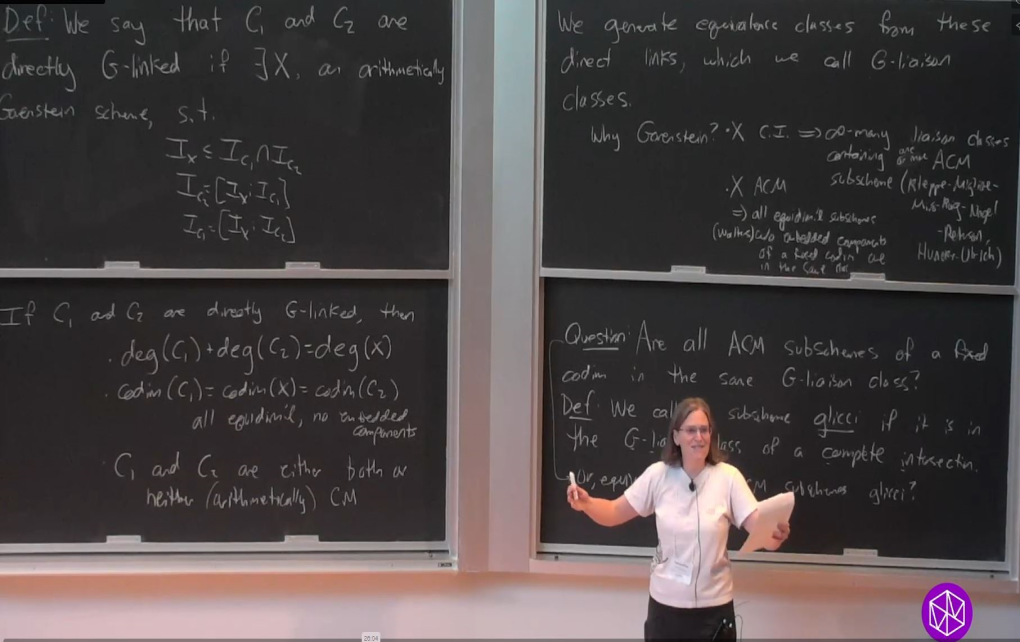Recent Developments in Commutative Algebra: "Polarization and Gorenstein liaison"
Presenter
April 19, 2024
Keywords:
- Commutative rings
- modules
- ideals
- mixed characteristic
- Frobenius powers
- test ideals
- tight closure
- perfectoid methods
- singularities
- birational algebraic geometry
- multiplier ideals
- symbolic powers
- syzygies
- free resolutions
- homological methods
- derived categories
- polynomials
- monomial ideals
- toric varieties
- Schubert varieties
- combinatorial commutative algebra
- equivariant ideals
- maximal Cohen-Macaulay modules
- applications of representation theory
- twisted commutative algebras
- D-modules
- local cohomology
- computational commutative algebra
MSC:
- 05Exx - Algebraic combinatorics
- 11Sxx - Algebraic number theory: local fields
- 11Txx - Finite fields and commutative rings (number-theoretic aspects)
- 13-XX - Commutative algebra
- 14-XX - Algebraic geometry
- 16Exx - Homological methods in associative algebras {For commutative rings
- see \newline 13Dxx
- for general categories
- see 18Gxx}
- 18Gxx - Homological algebra in category theory
- derived categories and functors [See also 13Dxx
- 16Exx
- 20Jxx
- 55Nxx
- 55Uxx
- 57Txx]
- 19Axx - Grothendieck groups and $K_0$K_0 [See also 13D15
- 18F30]
- 19Lxx - Topological $K$K-theory [See also 55N15
- 55R50
- 55S25]
- 20Jxx - Connections of group theory with homological algebra and category theory
Abstract
The major open question in the theory of Gorenstein liaison is whether or not every arithmetically Cohen--Macaulay subscheme of $\mathbb{P}^n$ can be G-linked to a complete intersection. Migliore and Nagel showed that, if such a scheme is generically Gorenstein (e.g., reduced), then indeed it can be after re-embedding so that it is viewed as a subscheme of $\mathbb{P}^{n+1}$. Motivated by this result, we consider techniques for constructing G-links on a scheme from G-links on a closely-related reduced scheme.
Polarization is a tool for producing a squarefree monomial ideal from an arbitrary monomial ideal. After reviewing the key aspects of liaison and polarization, we will describe conditions that allow for the lifting of a basic double G-link induced from a vertex decomposition of the Stanley--Reisner complex of the polarization of an ideal $I$ to a basic double G-link of $I$ itself. We will introduce a notion of polarization of a Gr\"obner basis of an arbitrary homogeneous ideal and give a result for geometric vertex decomposition and elementary G-biliaison that is analogous to our result on vertex decomposition and basic double G-linkage. Time permitting, we will give an application to vertex decompositions of Stanley--Reisner complexes of polarizations of stable Cohen--Macaulay monomial ideals and of artinian monomial ideals, extending a recent result of Fl{\o}ystad and Mafi.
The work described in this talk is joint with Sara Faridi, Jenna Rajchgot and Alexandra Seceleanu.
